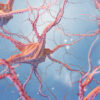A group of researchers set out to determine if feeding problems may serve as indicators of developmental delay later in life.
As it appears online in the Journal of Pediatrics, the study determined that recurring feeding problems in infancy, particularly those that exceed well into the third year, may be indicative of high risk for developmental delay.
For the study, the mothers of nearly 3,600 children had been assessed as part of a longitudinal cohort study. The study evaluated the children’s feeding problems and developmental delays by the use of the Ages and States Questionnaire (ASQ). The instrument was used at 18, 24, and 30 months of age.
It was found that children with a history of feeding problems were over two times as likely to not score satisfactory in the screening instrument for markers of developmental delay, indicating a possible association between feeding problems and developmental delay later in childhood.
In the wake of these findings, the authors of the study cautioned the ramifications of feeding problems, stating that it may trigger a host of developmental problems.
Researchers said feeding problems “may further contribute to undernutrition and poor physical growth, which impact development, or they relate to emotional temperament, which may contribute to social and behavioral delays.”


